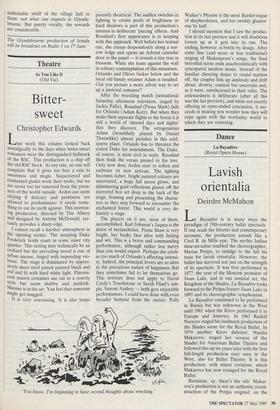Theatre
As You Like It (Old Vic) Bitter-
Christopher Edwards
Last week this column looked back nostalgically to the days when bitter-sweet romances were the distinguished hallmark of the RSC. This production is a chip off the old RSC block. At any rate, no one will complain that it gives too free a rein to sweetness and magic. Sequestered and enchanted glades work their tricks, but we are never too far removed from the press- ures of the world outside. Arden can seem cloying if delicacy and prettiness are allowed to predominate: it needs some- thing to cut its teeth against. This interest- ing production, directed by Tim Albery and designed by Antony McDonald, cer- tainly provides a sharp edge.
I cannot recall a harsher atmosphere in the opening scenes. The usurping Duke Frederick holds court in some inner city quarter. This setting may technically be an orchard but the prevailing mood is one of urban unease, tinged with impending vio- lence. The stage is dominated by oppres- sively- sheer steel panels painted black and red and lit with hard white light. Fluores- cent mauve costumes are cut to a courtly style but seem shabby and punkish. Malaise is in the air. You feel that someone might get mugged. It is very convincing. It is also trans- parently theatrical. The sudden switches in lighting to create pools of brightness or hard shadows is part of this production's interest in deliberate 'placing' effects. And Rosalind's first appearance is in keeping with this approach. Well before her textual cue, she creeps despondently along a nar- row ledge and opens an Advent calendar door in the panel — it reveals a tiny tree in blossom. While she leans against the wall in solitary contemplation of this miniature, Orlando and Oliver bicker below and the loyal old family retainer Adam is insulted. Can you picture a more adroit way to set up a pastoral romance?
After the wrestling match (sensational Saturday afternoon television, staged by Jackie Pallo), Rosalind (Fiona Shaw) falls for Orlando (Adam Kotz). But when they make their separate flights to the forest it is still a world of 'shrewd days and nights' that they discover. The octogenarian Adam (beautifully played by Daniel Thorndike) almost perishes in this cold, sparse place. Orlando has to threaten the exiled Duke for nourishment. The Duke, of course, is most civil in reply. Rosalind then finds the verses pinned to the tree. Only now does Arden start to soften and embrace its new arrivals. The lighting becomes richer, bright painted colours are uncovered, a huge full moon glows, and shimmering gold reflections glance off the mirrored box set deep in the back of the stage, framing and presenting the charac- ters as they step forward to encounter the enchanted forest. This world is very de- finitely a stage.
The players on it are, most of them, accomplished. Karl Johnson's Jaques is the driest of melancholics. Fiona Shaw is very bright, her beaky face alive with feeling and wit. This is a brave and commanding performance, although rather less merry than you would expect. Perhaps she catch- es too much of Orlando's affecting intensi- ty. Indeed, the principal lovers are so alive to the precarious nature of happiness that they sometimes fail to let themselves go. This stricture does not apply to David Cardy's Touchstone or Sarah Hind's sim- ple, buxom Audrey — both give enjoyable performances. I could have done with even broader humour from the rustics: Polly `You know, I'm beginning to have second thoughts about wrecking.' Walker's Phoebe is the most Bardot-esque of shepherdesses, and too swishly glamor- ous by half.
I should mention that I saw the produc- tion in its last preview and it will doubtless loosen up as it gets into its run. The ending, however, is brittle by design. After some fine (and more or less traditional) singing of Shakespeare's songs, the final betrothal scene ends anachronistically with syncopated modern music. Instead of the familiar cheering dance to round matters off, the couples link up aimlessly and drift about, drowsy, content but uncertain and, as it were, unrehearsed in their roles. The awkwardness is deliberate (after all this was the last preview), and while not exactly offering an open-ended conclusion, it suc- ceeds in making you wonder how they will cope again with the workaday world to which they are returning.


















































 Previous page
Previous page